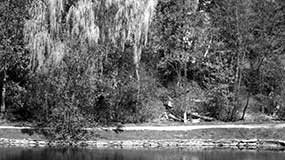
 A proposal to build a car bridge through Jackson Creek Park as an extension of the Parkway is still being discussed by city planners. The proposal was originally voted down in 2003, but because less than 50% of voters were present, the vote was not binding.
A proposal to build a car bridge through Jackson Creek Park as an extension of the Parkway is still being discussed by city planners. The proposal was originally voted down in 2003, but because less than 50% of voters were present, the vote was not binding.
Jackson Creek Park is a beloved recreational area for many Peterborough residents. With wetlands, hiking trails, forests, a playground and a waterway that links everything together, Jackson Creek Park has something for everyone. One of the key features of the park is the Kiwanis Trail, which takes hikers and bikers through four kilometers of wetlands, meadows and forests. The trail is wheelchair and stroller accessible and provides a gateway to nature for both the young and old.
Wetlands in particular are of importance to our natural environment. The biodiversity that occurs provides a habitat for hundreds of species that do not exist anywhere else. As well, wetlands are a nursery for fish, reptiles, insects and birds. Wetlands also act as filters for pollutants that would otherwise seep into our groundwater and drinking supplies. In regards to Jackson Creek, the wetlands there prevent pollution from traveling through the creek and into the city and beyond.
The bridge proposal is one of many ideas for an extension of the Parkway route. The need to have a more direct route from Parkhill to Landsdowne has been in discussion in city council for years. In November of last year, city council implemented a City-wide Transportation Plan Review to examine transportation development in Peterborough. The extension of the Parkway Corridor was included in this plan. Due to environmental concerns that have been expressed by a variety of residents, city council initiated the Parkway Corridor Class Environmental Assessment in July 2012. The first meeting to review the study’s findings was held on October 2, which was when residents found out that a bridge through Jackson Creek Park was still a viable option.
Jackson Creek is not just a park, but an area that contains a wealth of biodiversity. Dr. Stephen Bocking, who is a professor in the Environmental and Resource Science/Studies Program at Trent University, explains that extending the Parkway through Jackson Creek Park would have a devastating impact on this natural habitat. Dr. Bocking was recently the co-recipient of an Insight grant of $175, 000 to examine land use and environmental conflicts in Southern Ontario. In addition to being a widely used space, Dr. Bocking says that the park is unique because it has been left in its natural state and was not manicured. He believes that the prospective Parkway route is a wrong step both in terms of design and in sustainability.
City Council also recently implemented a Greater Peterborough Area Community Sustainability Plan and an Urban Forest Strategic Plan. Both plans focus on environmental concerns regarding city planning and development.
Alternative routes for extending the Parkway include building a two-lane road along the Parkway greenbelt, between Fairbairn and Cumberland. Widening Fairbairn is another proposition. However, these proposals come with an environmental impact, as well. A two-lane road would cut into a lot of the green space, including fields in which resident children play. There is also an economic cost, with estimates for a Parkway extension surpassing more than 50 million dollars. Some have suggested that a more direct route to Landsdowne is needed on the east end of the city, not on the west end, and that all the proposals for extending the Parkway ought to be refocused to situate on the east side of the river.
The Parkway extension brings up the question of whether a continued focus on accessibility for automobiles is really the direction Peterborough should be taking. In a city known for its many kilometers of bike trails, some residents would like to see city planning move away from a reliance on oil-powered vehicles to more sustainable means of transportation.

